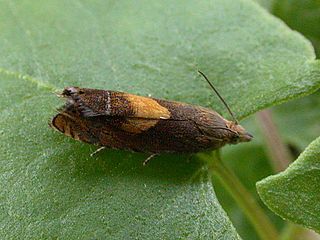
Dichrorampha petiverella is a moth of the family Tortricidae. It is found in the Palearctic realm.

Swammerdamia pyrella is a moth of the family Yponomeutidae. It is found in Europe, North America and Japan.

Grapholita funebrana, the plum fruit moth or red plum maggot, is a moth of the family Tortricidae. It is found in the Palearctic realm. Like many of its congeners, it is sometimes placed in Cydia.

Paraswammerdamia lutarea is a moth of the family Yponomeutidae. It is found in Europe.
Hexadactilia civilis is a moth of the family Pterophoridae. It is found in Queensland, Australia.

Sphenarches zanclistes is a moth of the family Pterophoridae that is found in Australia.
Batrachedra megalodoxa is a species of moth of the family Batrachedridae. It is found in Australia.
Batrachedra volucris is a species of moth of the family Batrachedridae. It is found in Australia.
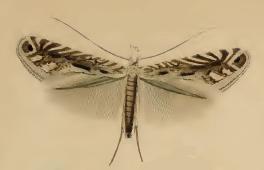
Parornix devoniella is a moth of the family Gracillariidae. It is known from all of Europe.
Platyptilia isoterma is a moth of the family Pterophoridae. It is found in New Zealand.
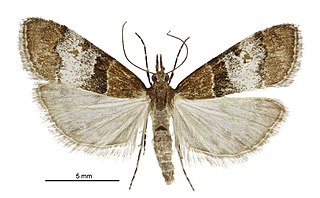
Antiscopa acompa is a moth in the family Crambidae. It was first described by Edward Meyrick in 1884. It is endemic to New Zealand and is found both the North and South Islands. The species inhabits native forest and adult moths are attracted to light.
Metasia ateloxantha is a moth in the family Crambidae. It was described by Edward Meyrick in 1887. It is found in the Australian states of Queensland and New South Wales.
Steniodes nennuisalis is a moth in the family Crambidae. It was described by Schaus in 1924. It is found in Peru.
Hypatima caryodora is a moth in the family Gelechiidae. It was described by Edward Meyrick in 1913. It is found in Assam, India.
Anarsia acerata is a moth in the family Gelechiidae. It was described by Edward Meyrick in 1913. It is found in southern India and northern Vietnam.
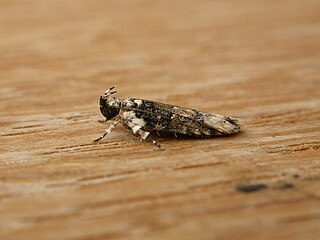
Ardozyga sodalisella is a species of moth in the family Gelechiidae. It was described by Francis Walker in 1864. It is found in Australia, where it has been recorded from Queensland and New South Wales.
Ephysteris synecta is a moth in the family Gelechiidae. It was described by Edward Meyrick in 1909. It is found in Namibia, Zimbabwe and Gauteng, South Africa.
Antiochtha achnastis is a moth in the family Lecithoceridae. It was described by Edward Meyrick in 1906. It is found in Sri Lanka.
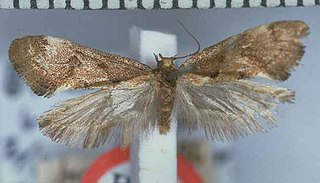
Tingena brachyacma is a species of moth in the family Oecophoridae. It is endemic to New Zealand and has been found in the south of the South Island. This species inhabits open swamps, native forest and scrubland and has been collected amongst Leptospermum. The adults of the species are on the wing in November and December.

Tingena horaea is a species of moth in the family Oecophoridae. It is endemic to New Zealand and have been observed in both the North and South Islands. The adults are on the wing in January.








